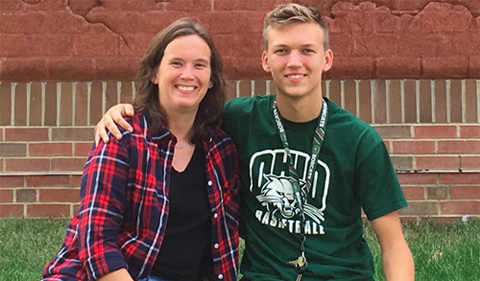by Kristin Distel
Jacob Collins ’20 is combining two majors to achieve one ideal career goal.
Collins, a sophomore whose goal is to become a city planner, is double-majoring in Economics and Urban Planning & Sustainability. This combination of specializations makes his goal much more achievable, he explains.
“These two majors will really help prepare me for city planning. It’s a perfect fit,” Collins states. “For example, part of my future job might be to determine how much parking meters in a downtown area should cost, and how that cost affects the surrounding businesses.”
Ideally, Collins would like to work in a larger city, particularly Columbus or Cincinnati. A metropolitan location would allow him to explore different specialties, including public transportation, sustainability, and policy issues.
A Childhood Interest Becomes a Career
Collins’s interest in the subject of place has been lifelong. He attributes this affinity to childhood immersion in maps and geography.
“My grandmother and I played a board game when I was younger that taught me where all the states are located, and that helped develop my interest in geography,” he explains. “I was always interested in country names and flags, too,” Collins adds.
As he began to look at universities to which he might apply for undergraduate studies, Collins learned that not only is Urban Planning & Sustainability an official area of study, but also that Ohio University offers this major.
“I hadn’t heard of the Urban Planning and Sustainability major before. I was looking into architecture at first, and eventually I found out about Urban Planning, which is like architecture but on city-wide scale instead of a single building,” he explains. “I’m interested in things like where bike paths should go, or whether a road should be wider or narrower. Small changes like that have a big effect on a city.”
Presenting Research at OHIO
Collins works closely with Associate Professor of Geography Dr. Yeong-Hyun Kim, with whom he has taken two courses—World Economic Geography and Urban Geography.
Collins credits Kim with helping him develop his research interests, as well as giving him a broader knowledge of geography as a whole.
“Dr. Kim has helped me so much already,” he says.
He began working on an impressive, broad research project during fall semester as part of Kim’s World Economics Geography course.
Collins’s project, titled “Shining a Light on a Small American City: Holophane Lighting and Manufacturing in Newark, Ohio,” culminated in a presentation and speech at OHIO’s Research Expo on April 12 at the Convocation Center. Kim encouraged him to present his work at the Expo.
Collins conducted a study in which he examined the effects of deindustrialization in Newark, Ohio. He research focused on Holophane, a Newark-based company that produces glass fixtures for streetlights. His research, which included interviews and on-site visits, investigated the company’s manufacturing processes.
“I wanted to learn more about the economics of Newark and how manufacturing fits into that economic system,” Collins remarks.
His research concluded that “Newark’s economic diversity allows struggling manufacturers to stay in the city while they rebound”—an especially important fact in light of Holophane’s decision to lay off nearly 800 employees in 2008.
Collins also considered the ways in which technological advances, such as LED lights, have changed not only the market but also small- and large-scale economies.
Like Mother, Like Son
Collins’s decision to attend OHIO and major in economics was a special joy for his mother, Michelle Collins, herself an OHIO alumna and economics major.
“When Jacob went off to OHIO, I wasn’t sad like some of the moms,” Michelle Collins explains. “I knew I would miss him, but I was so excited for him because I had been there, and I knew what a rewarding experience he was in for at Ohio University.”
His mother’s wonderful experience at OHIO was an important factor in Jacob’s decision to become a Bobcat. “She loved it here,” he explains. “I know it was one of the best times of her life.”
Michelle Collins, who is a part-time bookkeeper and full-time homemaker, credits OHIO with helping prepare her for life after Athens.
“OHIO helped with my networking skills. I learned to make friends in a diverse student population and to reach out to professors when I needed help,” she explains. “This prepared me for a working environment, including being able to approach my boss with questions and to work as a team alongside coworkers.”
Michelle Collins attended OHIO’s Research Expo and saw firsthand the way that her son utilizes the skills and knowledge he is gaining as an economics and urban planning and sustainability student.
“I’m proud he chose to follow in my footsteps,” she says. “I can’t wait to see how OHIO shapes his future.”




















Comments